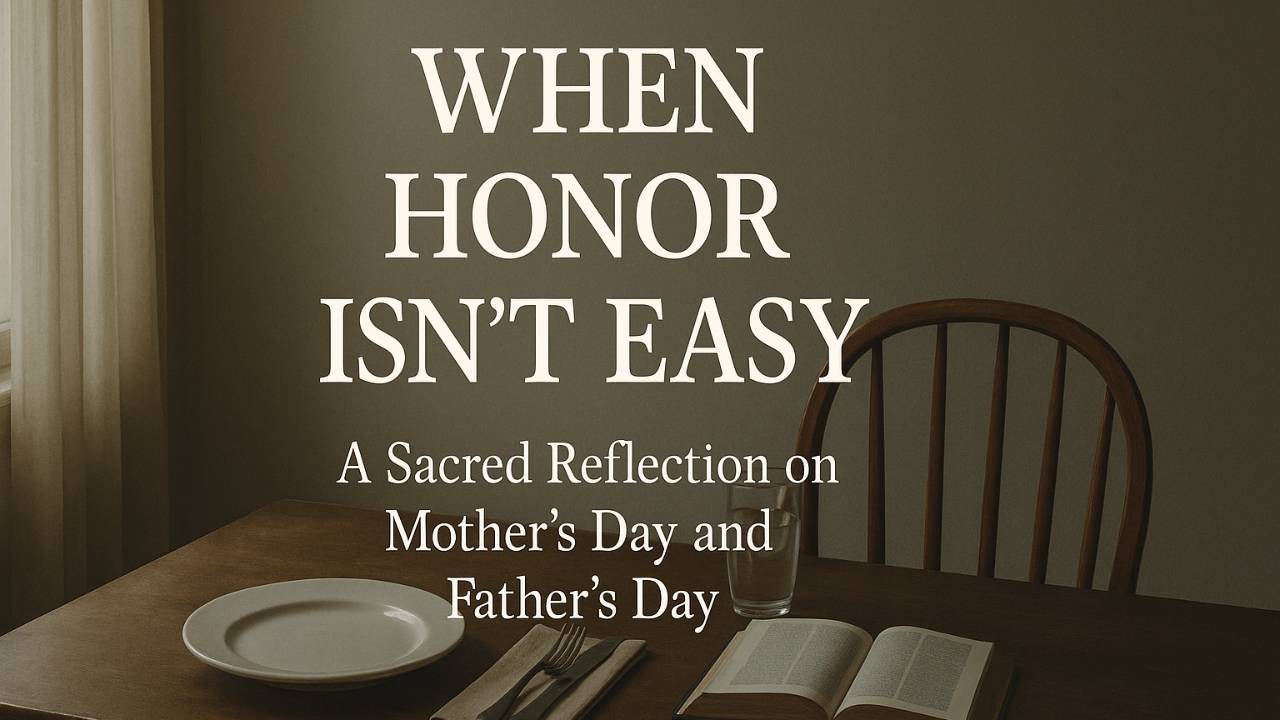When Honor Isn’t Easy: A Sacred Reflection on Mother’s Day and Father’s Day

When Honor Isn’t Easy: A Sacred Reflection on Mother’s Day and Father’s Day
“Honor your father and your mother, that your days may be long in the land that the Lord your God is giving you.” —Exodus 20:12
Each spring and summer, our culture pauses to honor those who gave us life. Mother’s Day and Father’s Day invite us to remember—and rightly so. Scripture calls us to honor our father and mother, not once but repeatedly (Exodus 20:12; Deuteronomy 5:16; Ephesians 6:1–3). This is a sacred invitation, not a cultural suggestion.
But these holidays, though well-intended, are relatively recent in their current form. Shaped today by cards, brunches, and social media, they can easily shift from moments of true honor to performances driven by guilt, expectation, or avoidance. Still, their historical roots offer something richer—and worth reclaiming.
The Sacred Roots of Parental Honor
Long before these modern holidays were federally recognized, earlier customs within church history marked certain days for parental honor. For example, in parts of Europe during the Middle Ages, the fourth Sunday of Lent became known as Mothering Sunday—a time when believers returned to their “mother church” (their church of baptism or local parish). Over time, it also became associated with honoring mothers in a broader familial sense.
Similarly, March 19 was designated in Catholic practice as a day to remember Joseph, the earthly guardian of Jesus. The Feast of St. Joseph focused on his humility, faithfulness, and protective care. While evangelicals do not observe these customs, their existence reflects a long-standing human impulse to acknowledge the significance of parental roles.
These historical observances remind us: the impulse to honor father and mother is not a modern invention. It reflects something sacred, written by God into the human heart.
When Honor Isn’t Easy
Still, for many, these days bring more pain than peace. What if my parent wasn’t safe? What if I never knew them? What if the grief is still fresh—or the silence still deafening?
Biblical honor isn’t performance. It is presence, prayer, and, sometimes, quiet endurance.
To honor doesn’t mean to pretend. It doesn’t erase abuse, deny abandonment, or rewrite reality to protect someone else’s reputation. Biblical honor is not sentimental. It is sacred. It may look like grief. It may mean silence rather than speech. For some, it means telling the truth with love. For others, it means letting go of vengeance without letting go of wisdom.
God sees it all—both the joy of good memories and the sorrow of broken ones. He commands honor, yes—but He also ministers comfort to the brokenhearted and sets the lonely in families (Psalm 68:6).
In Christ, we are not bound by the stories we inherited. We are adopted into a new family, with a perfect Father who never fails.
Through Jesus, we are loved without condition, known without shame, and welcomed into a story greater than our own—where grace rewrites every legacy.
When Honor Meets Estrangement
Jesus Himself acknowledged that loyalty to Him would sometimes divide even the most intimate of human bonds.
“Do not suppose that I have come to bring peace to the earth,” He said. “I did not come to bring peace, but a sword... A man against his father, a daughter against her mother...” (Matthew 10:34–36)
These are sobering words. They remind us that following Christ may, at times, lead to estrangement from loved ones—especially when faithfulness requires clarity, boundaries, or breaking generational patterns of harm.
For the Christian, estrangement is never ideal, but it may be necessary—for safety, for sanctification, or for truth to breathe. Honor in such cases may be quiet. It may mean praying instead of calling. It may mean blessing instead of biting back. It may mean holding the door open—without forcing reconciliation.
Even when the family table is broken or the phone never rings, we can entrust our sorrows to the God who understands division and did not shy away from it. Jesus knows what it is to be misunderstood by His own. He also knows how to love without compromising truth.
A Sacred Invitation
So this Mother’s Day or Father’s Day, celebrate freely if you can. Grieve honestly if you must. And honor—not as a social compulsion, but as a sacred act of obedience before God. That may look different for each of us. But in the Spirit, it will always look like love.
How might God be inviting you to practice sacred honor this year?
Lord, teach us how to honor as You do—with truth and grace. Heal what’s broken, strengthen what remains, and help us walk in love, even when it costs us. Amen.
If you’re a pastor or ministry leader, consider how your words on these holidays can hold both truth and tenderness—for the rejoicing and the grieving alike.
If this reflection spoke to your experience, feel free to share it with someone who may need grace this season.
